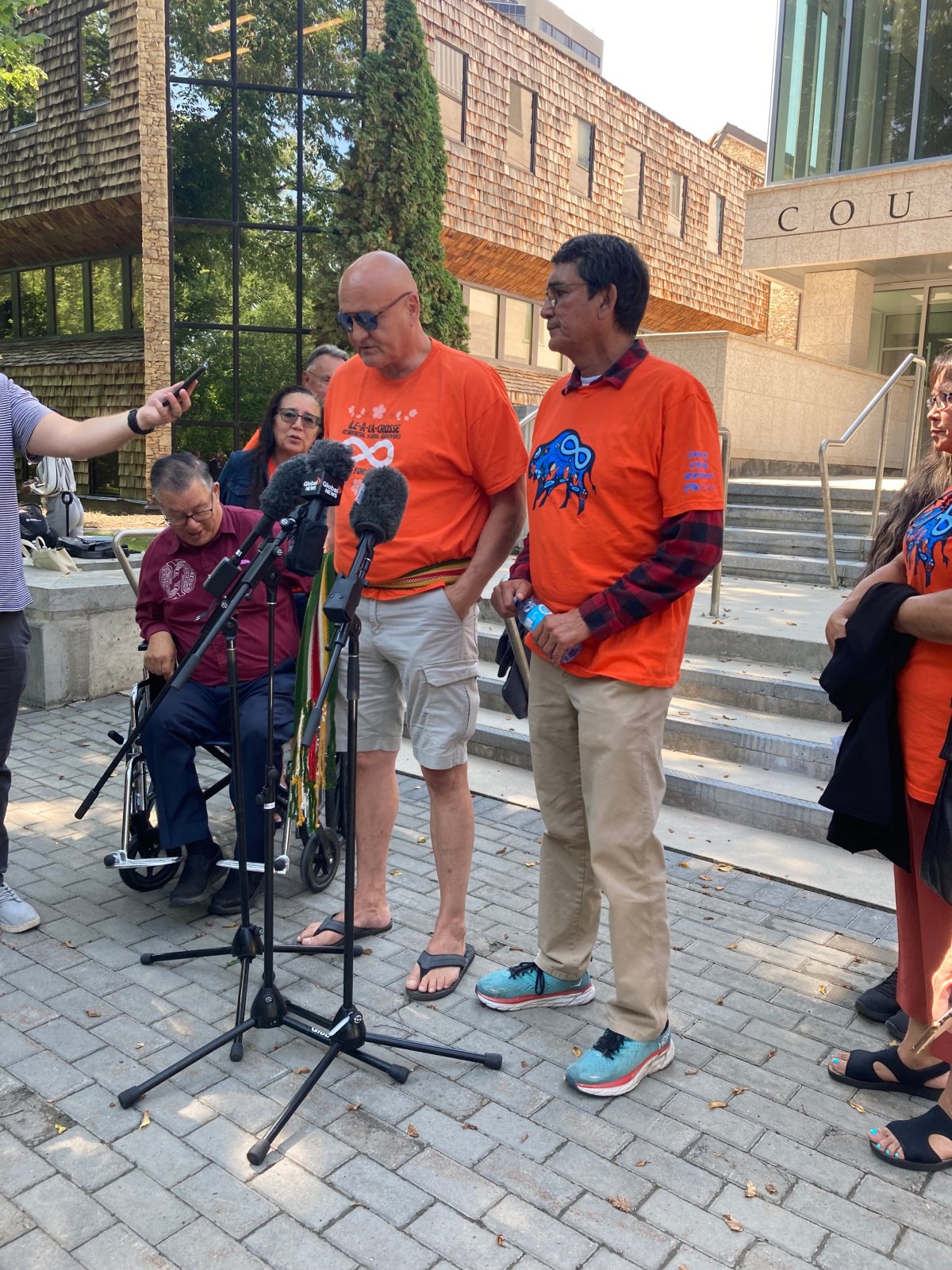There was a heated argument in the Court of King’s Bench on Wednesday as a group of residential school survivors fought to further their case against the provincial and federal governments.

Survivors of the Île-à-la-Crosse residential school filed a class action lawsuit, Gardiner, in December against the province and the federal government, seeking compensation for harms and abuses they say were experienced at the school.
On Wednesday, the plaintiffs asked the court to throw out a 17-year-old, almost identical class action with the same goals regarding the school.
The Aubichon case, launched nearly two decades ago by plaintiffs with Merchant Law Group, has still not been certified by the courts.
All but four plaintiffs have since passed away.
“I just lost an uncle earlier this month. We just lost another survivor who was buried in my home community yesterday. These people haven’t seen any results whatsoever,” said Malvina Aubichon, survivor and plaintiff of the original class action.
The Île-à-la-Crosse school ran in Canada from the 1820s to the mid-1970s before it burned down.
The Île-à-la-Crosse Survivors Committee previously stated students from that school were excluded from the Indian Residential Schools Settlement Agreement because the school wasn’t considered an Indian residential school.
“We have to start moving on this,” said survivor and lead plaintiff Louis Gardiner. “We want action. We want closure. Elders that are in their 80s want to put closure to this.”
- Premier Moe responds to Trudeau’s ‘good luck with that’ comment
- Drumheller hoping to break record for ‘largest gathering of people dressed as dinosaurs’
- As Canada’s tax deadline nears, what happens if you don’t file your return?
- Posters promoting ‘Steal From Loblaws Day’ are circulating. How did we get here?
Gardiner attended Île-à-la-Crosse for nine years and went to court Wednesday to represent all of the survivors.
“This is seven generations of harm in northwest Saskatchewan, and we see it on a daily basis,” said Michelle LeClair, vice president of Métis Nation Saskatchewan. “We see additions. We see suicides. The suicide rate in northwest Saskatchewan is probably one of the highest per capita in this country and that is a direct result, I believe of seven generations of harm in a residential school.”
On Wednesday, the plaintiffs in the Gardiner lawsuit, filed in December 2022, fought for a stay of proceedings in the Aubichon case so that the Gardiner plaintiffs can proceed with their case.
Justice Naheed Bardai, presiding over the Gardiner case, noted that under the Supreme Court of Canada recommendations, two similar class actions should not move forward simultaneously for the sake of efficiency within the courts.
Anthony Merchant, representing Merchant Law Group on Wednesday, blamed the provincial government for dragging out the Aubichon case.
“The provincial government is not prepared to pay any compensation in relation to this case,” Merchant said. “The provincial government position has always been that Indigenous are not provincial, they are federal.”
He said the federal government was not prepared to compensate unless the province was included.
“There hasn’t been in any province, or Canada, a settlement involving a Métis non-status Indian school.”
Île-à-la-Crosse mayor and plaintiff Duane Favel said that Merchant never consulted with the plaintiffs of the original case while it was active.
“We gave Merchant a chance for 17 years and he never certified the class action lawsuit and we were under the impression that this class action was moving forward, that it was certified and there was no communication with the survivors and steering committee,” Favel said. “I’ve been on the committee since 2005. I’ve never had a conversation with Merchant. He has never been at our table.”
Aubichon, who was on the original class action, said the same.
“He has never consulted with me as he has told the court here.”
On Wednesday, Merchant spoke for over two hours, trying to convince the court that his case should be allowed to continue.
He said he was concerned that the new claim under the Gardiner case would leave out the families of the deceased Aubichon plaintiffs in receiving any settlements if the original class action were to move forward. Lawyer for the Gardiner case, Margaret Waddell, said a simple amendment to the statement of claim could fix that.
“We simply need to add a couple of words to the claim, an amendment, to say it is brought on behalf of the estates as well as the living people. It’s easily done.”
Waddell said moving forward, she would make sure the families of deceased Aubichon action will be included in the Gardiner action.
As for the end of Wednesday’s argument, Justice Bardai reserved his decision.




Comments